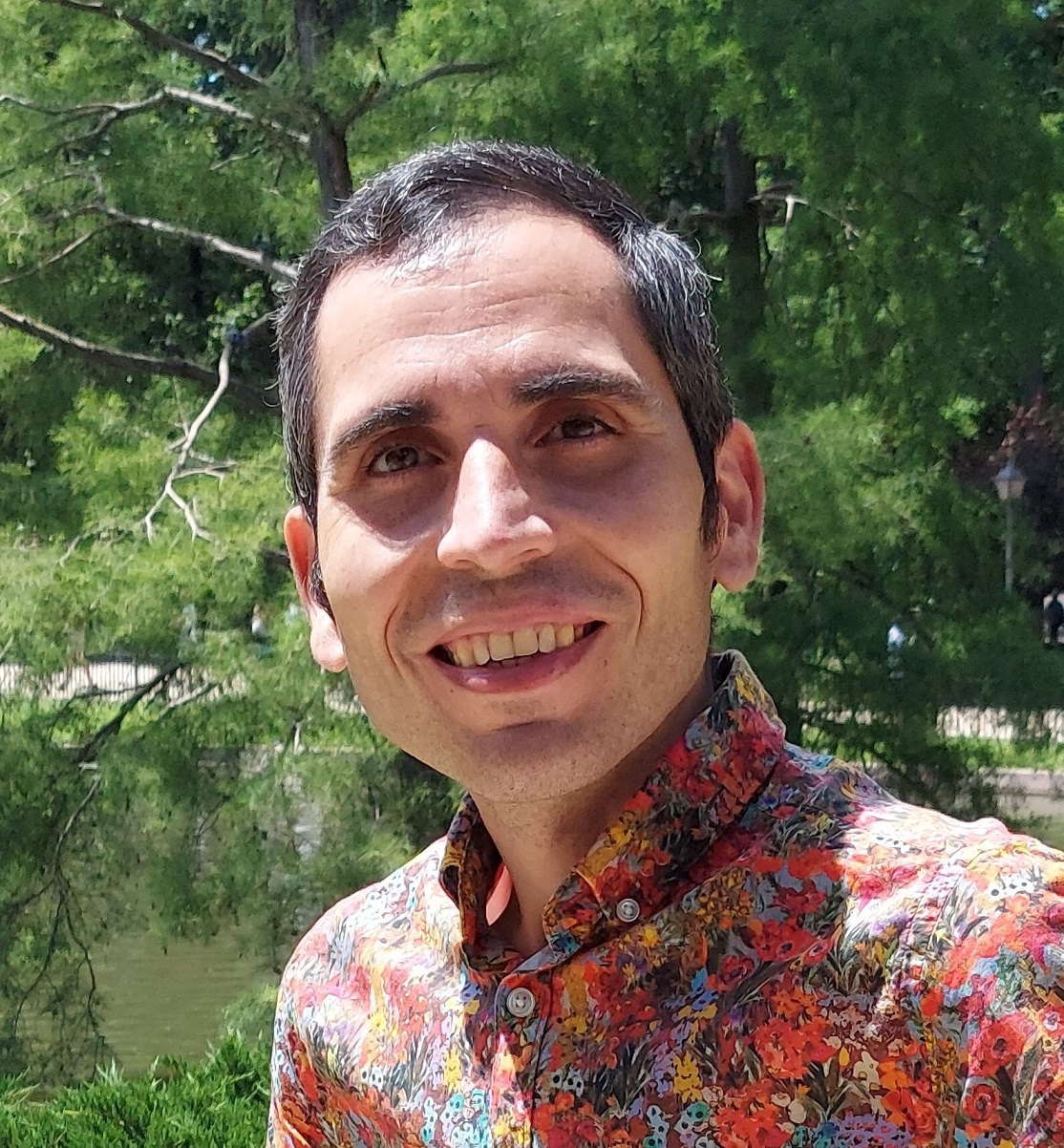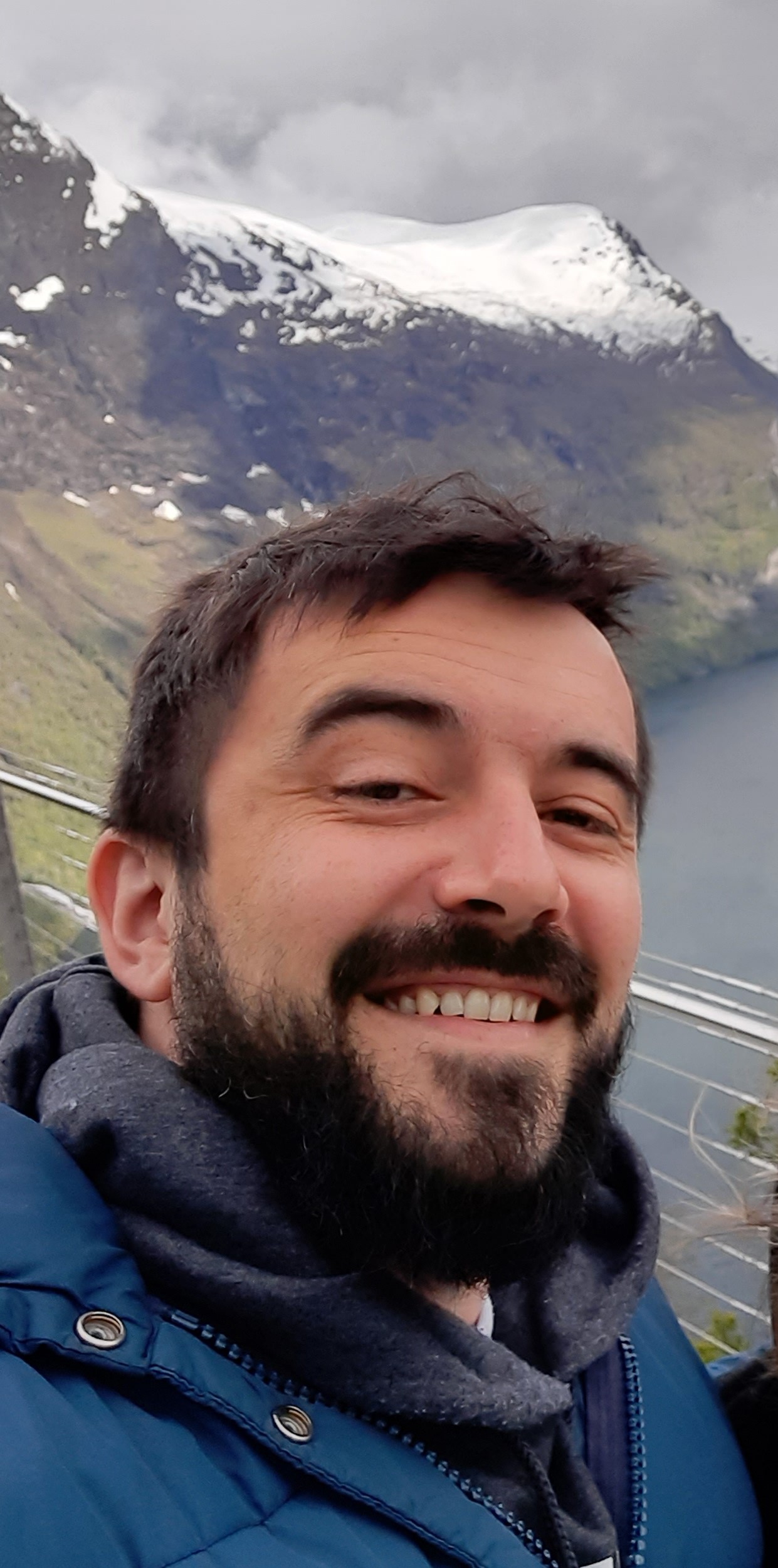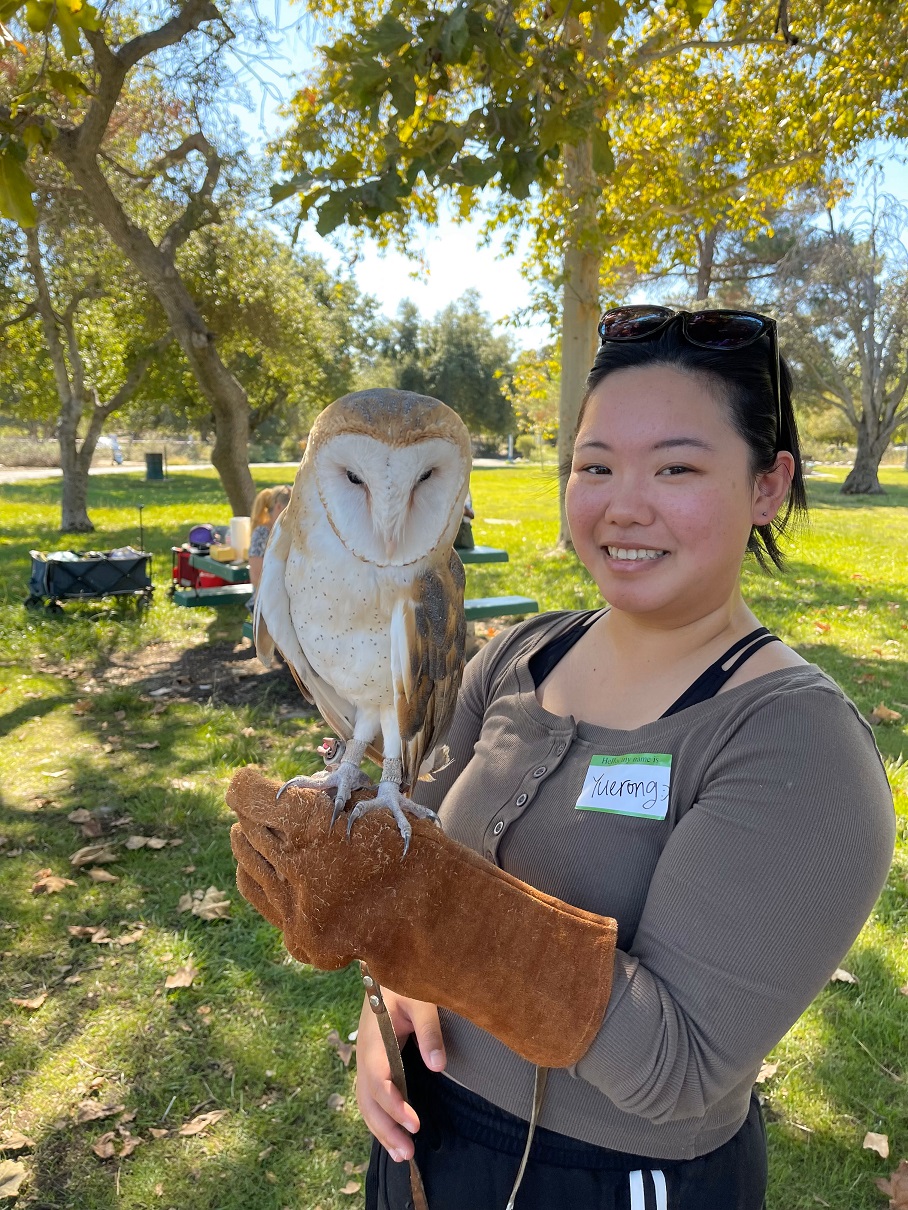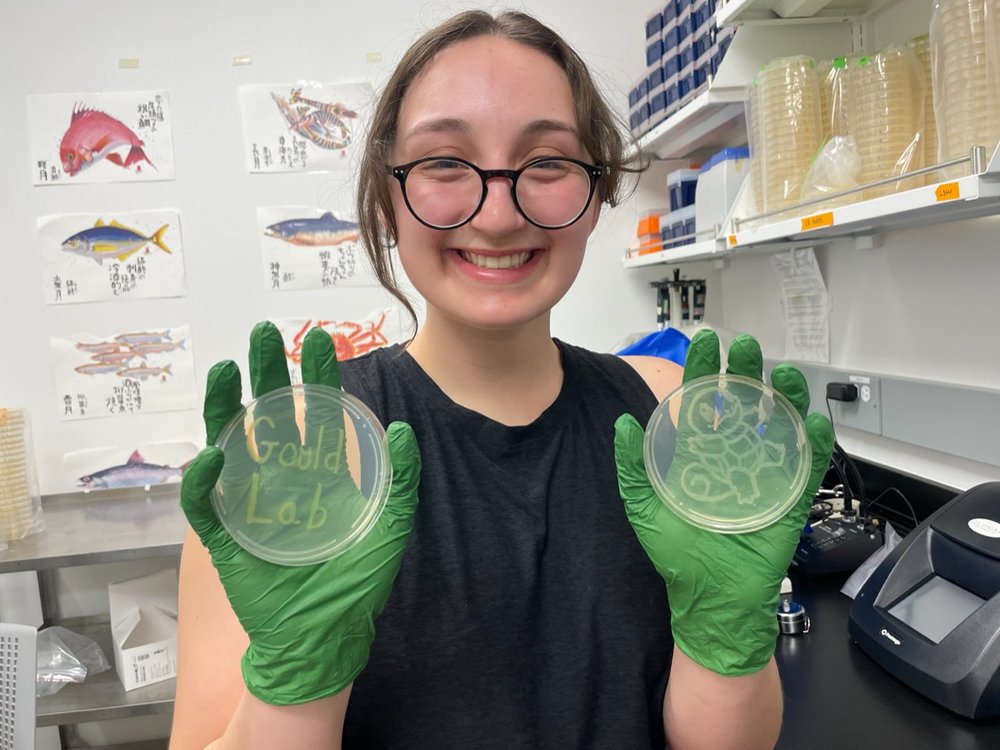Current members

Jessica Aguilar
Postdoctoral fellowEmail: jmagui at stanford dot edu
Web site
Jessica is an evolutionary ecologist interested in understanding the impacts of a plant diet on insects and their microbiomes. She earned her PhD in 2024 with Noah Whiteman at UC Berkeley studying interactions between the leaf-mining fly Scaptomyza flava, their host plants, and their gut microbiome. She joined the lab as an NSF Postdoctoral Research Fellow in August 2024. Jessica is currently working on understanding the evolutionary dynamics of the bacteria and phage in the gut of the coffee berry borer beetle, especially in response to dietary plant toxins. She is passionate about creating welcoming, inclusive academic environments where people can thrive. When not taking care of bugs in the lab, she enjoys spending time with her family and sewing quilts.

Sergio Álvarez-Pérez
Visiting ScholarEmail: sergioaperez at ucm dot es
Website
Sergio is a microbiologist currently appointed as Senior Researcher at Complutense University of Madrid. He joined the lab as a Complutense Del Amo Visiting Fellow in September 2024. Sergio's current research focuses on microbial communities inhabiting floral nectar, a research line he has been working in since his first postdoctoral position at Doñana's Biological Station (2010-2012) under the supervision of Carlos M. Herrera. He further developed this research line as Marie Skłodowska-Curie Fellow at Bart Lievens's lab in KU Leuven. Additionally, he has ample experience in microbial systematics and taxonomy, which has resulted in the description of several new species of floral nectar microbes. His goal as a scientist and educator is to promote understanding of microbiology in a comprehensive and multidisciplinary way.

Tadashi Fukami
ProfessorE-mail: fukamit at stanford dot edu
CV
Tad's primary interest is to understand historical contingency in community assembly, but he is also broadly interested in how species interact with one another in ecosystems, and enjoys working with other lab members on the projects that they bring to the lab. He also studies traditional ecological knowledge (TEK) and seeks to practice two-eyed seeing, especially in his role as Faculty Director of Jasper Ridge Biological Preserve ('Ootchamin 'Ooyakma). He earned his PhD at the University of Tennessee, Knoxville, with Jim Drake and Dan Simberloff. He was then a postdoctoral fellow at Manaaki Whenua – Landcare Research in Aotearoa – New Zealand and Assistant Professor at the University of Hawaiʻi at Mānoa before joining the Stanford faculty in 2008.

Rosa McGuire
Postdoctoral fellowE-mail: rmcguire at stanford dot edu
Web site
Rosa is interested in combining theoretical and experimental approaches to study species interactions. She completed her PhD in 2023 with Priyanga Amarasekare at the University of California Los Angeles. She investigated how the temperature effects on life history traits scale up from individuals to population dynamics. Rosa worked with the bean beetle, Callosobruchus maculatus, as her model organism. She found that maturation rate might represent a constraint to adaptation to warming, and that the temperature response of competition differs at low versus high temperature extremes, leaving populations prone to stochastic extinctions. Rosa joined the lab in 2023 as an NSF Postdoctoral Research Fellow and is studying temperature effects on community assembly using nectar microbes.

Amaury Payelleville
Postdoctoral fellowEmail: amauryp at stanford dot edu
Google Scholar
Amaury is interested in understanding the interactions between microorganisms, their hosts, and their environment. He discovered entomopathogenic nematodes (EPNs) during his Master's study, and has since then trying to deeply understand all the interactions around their complex life cycle. He did his PhD research in Alain Givaudan's lab on the bacterium Photorhabdus laumondii TT01, which is the symbiont of the EPN Heterorhabditis bacteriophora. He investigated the importance of DNA methylation and epigenetics in the life cycle of P. laumondii, which switches from symbiosis with EPNs to pathogenicity in insects. Amaury then worked as a postdoc in Eric Cascales's lab on the type 6 secretion system of P. laumondii and its role in the competition occurring in the insect cadaver. He also investigated the role and dynamic of the small genetic modules called toxin–antitoxin systems in Laurence Van Melderen's lab. This work involved molecular microbiology of P. laumondii and bioinformatic screening of all available genomes of Photorhabdus to study the functionality of the toxin–antitoxin systems. Amaury joined the lab in February 2023 to investigate the ecology and evolution of the microbial communities associated with EPNs and their role in the ecosystem.
Ethan VanValkenburg
PhD studentE-mail: evanvalk at stanford dot edu
Web site
Ethan is interested in community ecology, plant-pollinator interactions, and how ecological networks respond to global change. He completed his BS in Ecology and Evolutionary Biology at the University of Michigan, Ann Arbor. He completed his honors thesis under Nate Sanders and Paul CaraDonna, studying sodium in nectar and its role in structuring plant-pollinator interactions at the Rocky Mountain Biological Station. During his undergraduate studies, he also investigated how climate and topography shape the dietary ecology and global biogeography of ungulate mammals with Catherine Badgley and Bian Wang. Ethan joined the lab in fall of 2023.

Magdalena Warren
PhD studentE-mail: mlwarren at stanford dot edu
Maggie is interested in microbial community ecology, and the effects that these communities have on their hosts, such as through production of secondary metabolites. She is fascinated by the impacts these organisms have on their chemical environments, and the influences of gradients, such as temperature and pH, on microbial communities. Maggie completed her BS in Cellular and Molecular Biology at California State University, Dominguez Hills, where she worked with Kathryn Theiss and Karin Kram, studying the nectar microbiome of Asclepias curassavica, a non-native tropical milkweed, across the urban heat island gradient of Los Angeles, to explore the connections between temperature, location, and the intricate microbe-plant-pollinator relationships, published in PLoS ONE. She also studied the induction of secondary metabolites by Salinispora tropica, a marine obligate actinomycete, through competition with environmental bacteria under Paul Jensen at the Scripps Institution of Oceanography. Maggie joined the lab in summer 2018 as an ADVANCE fellow and an NSF Graduate Research Fellow. To learn more, listen to her Roots to STEM podcast interview.

Yuerong Xiao
PhD studentEmail: yuerongx at stanford dot edu
Yuerong is interested in the ecological role of disturbance in the development and maintenance of biodiversity. During their undergraduate studies at UCLA, they conducted research under Bob Wayne on the biodiversity analysis of LA River through environmental DNA techniques. Studying the ecosystem and cultural functions of the river's communities led Yuerong to develop passion for environmental education and traditional ecological knowledge (TEK) as they learn from ecologists, Indigenous activists, artists, and citizen educators about the different meaning of restoration and stewardship. From 2022-2024, Yuerong worked under Joe Parker to test transgenic engineering in Dalotia coriaria (greenhouse rove beetle) for investigating the molecular and chemical basis of symbiosis. Joining the lab in fall 2024, Yuerong is excited to study how natural and man-made disturbances impact community assembly and functions, while also learning from TEK in their research. In their free time, Yuerong loves going on camping trips with friends, making hotpot, and bringing back cool rocks for their leopard gecko.
Affiliates

Andrea Nebhut
PhD studentEmail: anebhut at stanford dot edu
Web site
Andrea is a community ecologist studying how the changing climate alters plant competition, with interests in native-invader competition, functional traits and resource use, and climate feedbacks. She received her BS in Biology and Environmental Studies from Trinity University, where she studied how shortwave UV-B radiation alters plant pigmentation with Jim Shinkle, and her MS in Forestry and Natural Resources from Purdue University, where she studied the community impacts of invasive Callery pear in early-successional meadow environments and competitive relationships between invaders and their recipient communities in California serpentine grasslands with Jeff Dukes. Andrea joined the lab as a PhD student co-advised by Jeff and Tad in 2022.

Emma Román
PhD studentEmail: emmadroman at gmail dot com
Web site
Emma received an undergraduate degree from Middlebury College in Biology in 2022. Through her studies in Vermont, she developed a love for evolutionary ecology and microbial symbioses. While she enjoys terrestrial activities, such as gardening and hiking, in her free time, two internships and several courses she took during her undergraduate career opened her eyes to the wonders of aquatic research. From 2023 to 2024, Emma worked as a technician on a project centered around the symbioses between the coral reef fish, Siphamia tubifer, and the luminous bacterium, Photobacterium mandapamensis. This project was a collaboration between Alison Gould and Tad Fukami. Emma is currently a PhD student at Temple University, co-advised by Alison and Tad.
In addition, we often have undergraduate students in our lab, working on their thesis projects or assisting others to gain research experience. Many are funded by Stanford VPUE and NSF REU.
Our lab also hosts visiting students and scholars from other institutions. See below for former members.
August 2017 - Current and former lab members who attended ESA. Back row from left to right: Jes Coyle, Po-Ju Ke, Rachel Vannette, Devin Leopold and family, Holly Moeller, Ian Dickie (collaborator), Kai Zhu, Marion Donald, Noam Rosenthal, Andrew Letten. Front row from left to right: Tess Grainger, Tad Fukami, Priscilla San Juan, Nick Hendershot.
Former members and current affiliation
PhD students
Matthew Knope, 2006-2012, Asssociate Professor, University of Hawai‘i, HiloMelinda Kliegman, née Belisle, 2008-2013, Director of Public Impact, Innovative Genomics Institute
Holly Moeller, 2010-2015, Asssociate Professor, UC Santa Barbara
Devin Leopold, 2012-2017, Bioinformatics Scientist, Jonah Ventures
Po-Ju Ke, 2014-2019, Assistant Professor, National Taiwan University
Nick Hendershot, 2015-2020, Sierra Nevada Forest Ecologist, TNC
Priscilla San Juan, 2016-2022, Postdoc fellow, Natural History Museum of Los Angeles
Callie Chappell, 2017-2023, Postdoc fellow, Stanford University
Visiting PhD students
Caroline Tucker, 2012, Assitant Professor, UNC-Chapel Hill (previously)Tess Grainger, 2017, Postdoc fellow, University of British Columbia
Marion Donald, 2017, 2018, Postdoc fellow, Landcare Research, New Zealand
Postdoctoral fellows
Kabir Peay, 2010-2011, Associate Professor, Stanford UniversityBen Callahan, 2010-2014, Asssociate Professor, North Carolina State University
Rachel Vannette, 2011-2015, Associate Professor, UC Davis
Peter Zee, 2013-2015, Assistant Professor, University of Mississippi
Meike Wittmann, 2014-2015, Professor, Bielefeld University
Kai Zhu, 2014-2015, Associate Professor, University of Michigan
Manpreet Dhami, 2014-2017, Senior Researcher, Landcare Research, New Zealand
Andrew Letten, 2015-2017, Lecturer, University of Queensland
Niv DeMalach, 2018-2019, Senior Lecturer, Hebrew University of Jerusalem
Megan Morris, 2018-2020, Associate Manager of STEM Workforce Development, ORAU/ORISE
Leslie Decker, 2018-2021, Scientist II, Perfect Day
Amanda Wu, 2022-2023, Lecturer, Stanford University
Lucas Nell, 2022-2024, Postdoc fellow, Cornell University
Master's student
Noam Rosenthal, 2017-2018, PhD student, UCLAVisiting scholars
Hirokazu Toju, 2015-2016, Professor, Kyoto UniversityKaoru Tsuji, 2015, 2017, 2021-2022, Associate Professor, Kobe University
Technician
Marie-Pierre Gauthier, 2011-2014, Biological Scientist, University of FloridaLecturer
Jessica Coyle, 2016-2018, Assistant Professor, St. Mary's College of CaliforniaJesse Miller, 2018-2022, Natural Heritage Botanist, State of Washington